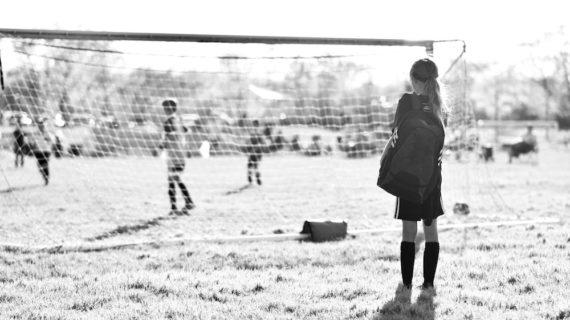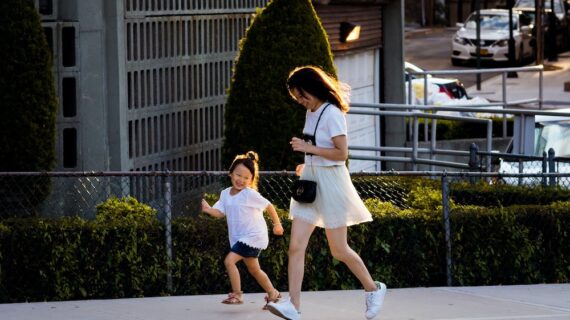
What families need to know about ‘eggshell parenting’
Photo above by Tim Ellis via Flickr/Creative Commons.
Most of us have been there: On a really bad day when all kinds of things are coming at you, your child starts misbehaving in some minor way. And you, under pressure from work or worries about paying bills or a million other things, overreact. Maybe you raise your voice or say something sharp, getting far more irritated than the situation actually requires.
Many parents have moments like that. But when stress and longstanding habit makes that overreaction a regular pattern, the impact on kids is real and worrisome. Fortunately, it’s possible to change that pattern.
Counseling and Wellness Center of Pittsburgh founder Stephanie Wijkstrom has begun teaching local parents about changing this behavior. The name for this pattern – “eggshell parenting” – is relatively new, though it has existed in some families for generations. It describes how children learn to “walk on eggshells,” stressing out their nervous systems as they try not to set off parents’ reactions.
It doesn’t help them behave well. Often, in fact, it does the opposite. And as that poor behavior causes more reaction from their parents, the cycle continues.
In her work as a therapist, Wijkstrom has seen how much things can change when parents discover that they can regulate their emotions in new ways. As that happens, the parents can begin teaching their kids to cope
Kidsburgh spoke with Wijkstrom to learn more.
What does ‘eggshell parenting’ look like?
Imagine a parent at a grocery store with young children. If a toddler begins having a bit of a tantrum, that might set off the parent’s emotions. As that parent gets more upset, “an unhelpful and eggshell kind of parenting response to the tantrum might be, ‘Stop! Stop crying. Shut up. You can’t do that in here,’” Wijkstrom says. “Those would be unhealthy, shaming kinds of responses.”
“What would be healthier is to offer some soothing,” she says. “We make our voice grow softer and calmer.”
You might not feel calm in the moment, “but you can rise above that situation in order to meet the needs of the child,” she says. “So you take a deep breath and you regulate yourself in order to be able to regulate your child.”
Again, “we’re not talking about a one-off instance where there’s a negative interaction. This is a consistent pattern of interaction where the parent’s thoughts, feelings and experiences take precedence in the relationship,” Wijkstrom says. “The eggshell parent is probably struggling emotionally.”
That struggle leads to bigger than normal reactions to everyday situations.
The parent “could be living in a state of chronic stress or hyper-arousal,” Wijkstrom says. “So they are easily triggered and preoccupied. They could be preoccupied with a mental health issue or a medical issue. There are so many things that can cause parents to not have the inner resources that are needed to do that really tough job of being a parent and taking care of another human. Many, many other things. … But the impact is massive on those kiddos.”
How is it impacting kids?
Over time, children raised by eggshell parents end up being neglected and traumatized. “It’s a sad thing to say, because I think that many eggshell parents might have good intentions,” Wijkstrom says. “They are not fully aware of their own emotions in order to provide effective parenting to their children.”
Healthy parenting teaches kids that their feelings matter,” she says. “Whatever happens, they’re responsive to their child’s needs.”
Being responsive, of course, doesn’t necessarily mean saying “yes.”
But “while that answer remains ‘no,’” Wijkstrom says, “we’re just understanding ‘OK, you’re upset.’ And we might even give our child a hug. We might look into their eyes. We’re definitely lowering our voice and making it softer so that they can hear us better. And we’re just sitting with that emotion and knowing that it is going to go away.”
No matter what a child is expressing, “it’s OK to express an emotion. And it’s going to go away. We just kind of have to go through those waves of feelings and know that it’s important, and that it’s good to say no — just as it’s important and good to model and understand those feelings.”
The benefit of shifting out of an ‘eggshell parenting’ habit
If a parent gets support with their own stress, and perhaps therapy to work through their own experiences, they can build a habit of regulating their reactions to things. And as parents learn to regulate, they can begin to co-regulate with their children.
Here’s how:
- BREATHING: Self-regulation means that your nervous system is able to calm down whenever it gets stressed out. Kids aren’t born with that ability, so “they’re reliant upon their parents in order to learn what it means to navigate the world and all of the feelings that come with it,” Wijkstrom says. “My No. 1 favorite tool for regulating and co-regulating the nervous system is taking a deep breath.” Breathing deeply is one of many “ways that we can trick our nervous system into calming down.” If we do that first with ourselves, then we’re able to model that skill and teach it to our kids.
- NAMING: Labeling your emotion can also calm you. Allow yourself a moment to think “OK. This is upsetting. I feel stressed out. Mental note: I can be calm.”
- SOOTHING. Once you are more regulated, you can use co-regulation with your child. “Not only are you giving that soothing to the child, but also they’re watching you take that breath,” she says. “Even little, little kids – they see that. And that is a building block for them to manage their feelings.”
To make all this possible, parents need to recognize that they can ask for help with their stress.
So often, “they’re already feeling overstressed because they’re working and have so many commitments on their time, and they feel really guilty if they’re not spending 100% of their time outside of work with their children. But that time, if it’s spent when the parent is not feeling really balanced, is not going to be quality time,” Wijkstrom says.
“So you really have to practice filling up our own cup first before we can show up for our children. And we can start really small. Maybe it’s getting a 20-minute walk every day or knitting class or painting class – whatever it is that fills up your cup is something that you really do have to make a priority. … You need to take care of you.”









